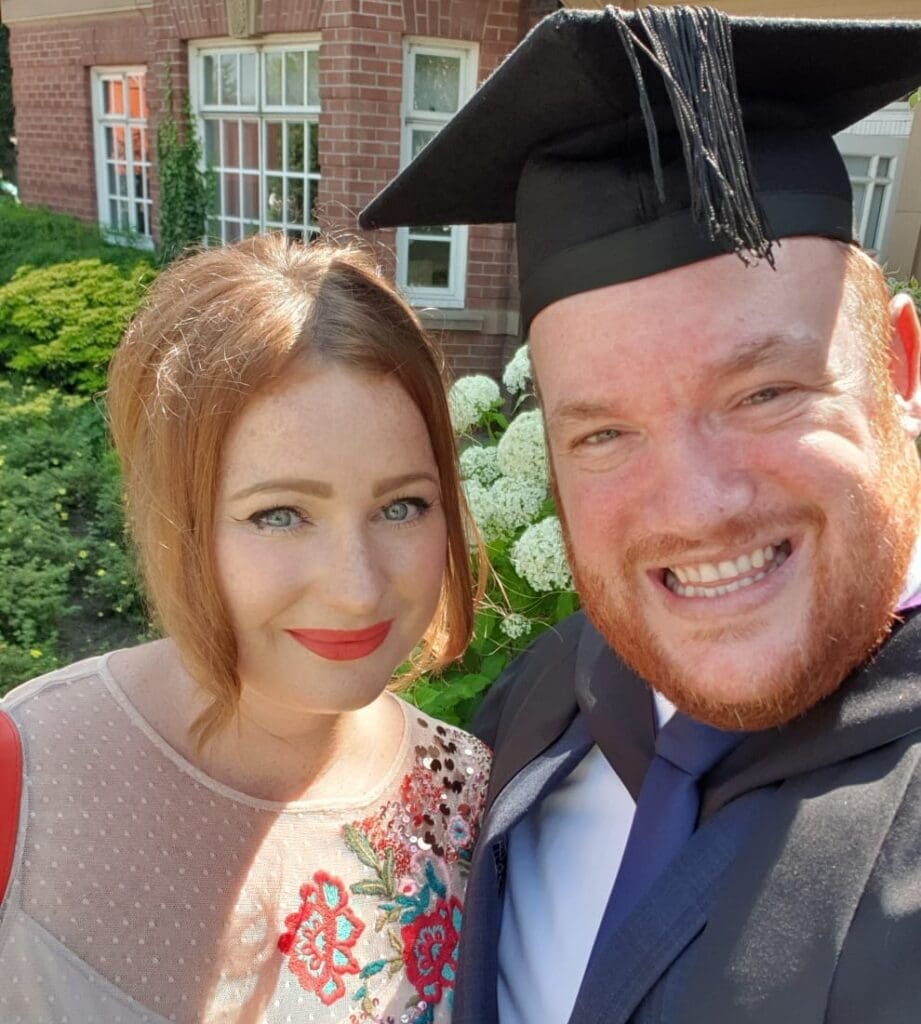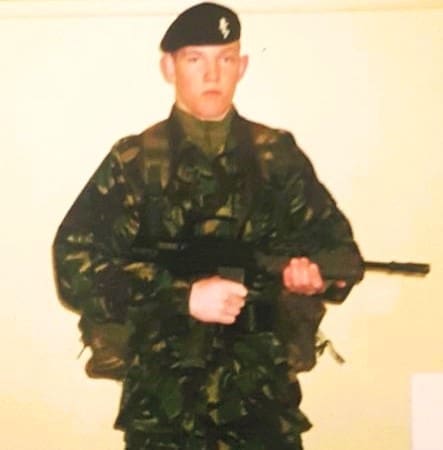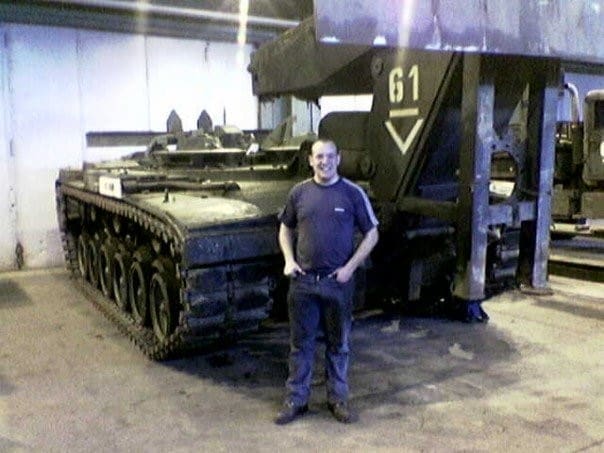Ways to team lead with honesty, empathy, and great communication
This article focuses on ways to team lead with honesty, empathy and great communication by looking at the career of a Field Engineer turned MHE (Material Handling Equipment) and Transport Service Manager. Phil McNicholas is a time-served Field Engineer, with a military mechanical background. Phil has experience working across Europe and expanded his horizons by completing a degree in business and management. After hands-on work as an FSE, Phil progressed into management and team leadership. Phil is a family man who lives in Liverpool with his wife, Rachael, and two children Teddy, 6, and Phoebe, 4.


An experienced MHE and Transport Service Manager leading teams
Background
Were you always interested in how things work and the technical side of business?
My interest in how things work came from a very young age. My dad used to fix his, and his neighbours’ cars, and was always in his shed tinkering with something. I was like his little shadow, watching him and doing bits that were safe enough for young hands.
Expanding on that, I joined the British Army at the age of 16 to complete a Technical Apprenticeship in the Royal Electrical and Mechanical Engineers (REME). REME are the soldiers who look after every bit of equipment held by the Army, from Generators and Trailers, to Rifles and Weapon Systems, and all the way across to Land Rovers and Challenger Main Battle Tanks. My specialisation was as a Vehicle Mechanic on Tracked Vehicles, so, effectively Tanks.
Production Planning and Control
During my time in the Army, I sustained a knee injury that prevented me from working on the vehicles. So during rehabilitation, I moved into the Production Planning & Control (PP&C) Office. This was where the senior soldiers managed the logistics and scheduling of the workload. As well they supported junior ranks with technical advice, by way of access to the full Technical Library, as well as general experience.
During this time, I realised and understood the benefits a good support system can offer the workers on the ground, allowing them to do what they are best at…repair and maintenance.
A key achievement was reducing the number of outstanding ‘man hours’ of work by ~50%. This was done by deep diving into the data line by line and realising the tasks were being duplicated. I recommended a simple process and reporting structure that would:
a) prevent this from happening again, and
b) would alert the management quickly if there was a spike in outstanding work hours.


Vehicles
What is the best vehicle you have ever driven? What would you still like to have the chance to drive?
I’ve been lucky enough to drive some incredible vehicles, Including the Challenger II Main Battle Tank, the American M1A1 Abrams Main Battle Tank, Humvees (the real Military type, not the civilian version) and 14T trucks on a skid pan. I guess I’d say the most interesting is the M1A1 Abrams, because there are not many Brits that have the opportunity to do that. Plus, it’s the only vehicle I’ve driven that has a Gas Turbine (Jet) engine.


Troubleshooting and fault finding
Are you generally good at fixing things? Can you give examples?
Troubleshooting and fault finding are my strengths. I have a few old-school repair techniques up my sleeve to get things running again, sometimes just to allow for a replacement part to be sourced, and sometimes these repairs can be indefinite. Otherwise, machinery tends to rely on component changes to get it back up and running. Then if salvageable, the component can be returned to a more appropriate setting, such as a workshop, for proper overhaul.
I will always try to help friends or neighbours, but mostly it’ll be around advice, rather than actual repair.
Sales and customer facing roles
During your career you have also worked in sales and customer facing roles. Why did these roles interest you?
To be honest, the role in sales was out of necessity while I was studying for my degree. Field work didn’t suit my schedule during this time, so it was more flexible to be office based with scheduled visits.
Whilst I absolutely love the customer facing side of sales, and building and nurturing relationships, my logical and methodical approach doesn’t always fit well with sales targets. I believe in the principles of ‘Tell not Sell’, whereby complete honesty and product knowledge will set you in good stead. However, it doesn’t always meet the order entry schedules that may need to be achieved for the day to day running of a business.
How did your technical skills help you?
Thorough product knowledge, as well as being able to recommend products, services, or processes that may not have been considered. Another strong skill that technical knowledge brings into a sales environment is the after care and life-cycle management of any assets bought.
Returning to studying before moving into team leading
You returned to studying and gained your BSc in Business and Management with Accounting and Finance. Was it easier to study the second time as you had some work experience?
I’ve always had an interest in business, and with my curious mind for how things worked, I wanted to understand it more thoroughly, and test my knowledge and experience. I had the opportunity to go and study as a mature student, but it definitely wasn’t the same experience as if I’d gone through at 18 years old! My son was born at the beginning of the second year, and my daughter was born a couple of months after I graduated.
I think the discipline of the Army really helped, insofar as meeting schedules, even if it meant working through the night. Work experience definitely helped by adding context to the theories we studied. As well, I was often able to share these with my fellow students…I’m not sure if this was good or bad, though.
How did you balance working, studying, and personal life?
You find the time, albeit, sometimes it does mean working at really unsociable times, and missing some occasions as you have deadlines or exams due.
My now wife, Rachael, was extremely supportive, and I owe it all to her. She didn’t just support me through it, but she was the one who gave me the confidence and backing to go for it in the first place.
If you really want something, then you will find a way to balance things out. Sometimes it means focusing on study, knowing that it is for a finite amount of time, and you’ll be able to go back to doing more things with the family.
Understanding the ‘why’ is of utmost importance.
Managing and team leading
How do you build relationships across the team?
Honesty, communication, and empathy.
Setting out and getting a buy in of the role expectations and your personal expectations allows everyone to be on the same page from the start.
From a management perspective, you need to constantly remember that humans are fallible (including yourself), and that things can go wrong. It is putting things in place to prevent them happening again that is the main thing.
You must also want to invest in people, to accept that if you do, they may move on with the experience that you’ve given them…but this is ok. This principle should lead to a keen and well-motivated team.
How do you keep communication open with all members of your team?
On a practical level, as before, set out and agree expectations, and then hold regular meetings to check progress and ongoing situations. Information is key for everyone involved. A great book around communication is Turn the Ship Around by L. David Marquet. I thoroughly recommend it for everyone.
How do you motivate your team?
Discipline beats motivation, for me.
I believe that a leader can inspire a team, but motivation has to come from within. We must all share common goals, and with the help of discipline, the motivation will come from there. Whilst that may sound like a brutal answer, I do still believe in recognising outstanding efforts and rewarding them. However, these shouldn’t just be in the form of things like free pizza, or something like that. Rewards look different to everyone, and it’s important as a leader to balance this as best as possible.
Team performance
How do you support someone in your team when things have gone wrong because of a mistake?
As I mentioned before, humans are fallible, and so we all make mistakes. If the person doesn’t show any emotion around a mistake, then that can be a worry. The important thing is to resolve the issue, show empathy, and work to prevent it in the future.
The root cause of the mistake may be process or procedural, so, as much as possible, a no-blame, open-source, and honest environment should be the aim.
How do you create a culture of individual responsibility for quality and performance?
This comes back to personal motivation.
People should take pride in their work; it should be a non-negotiable requirement. To foster this, individuals need to know that their management, and the company as a whole, have their best interests at heart. So that fulfilling the non-negotiables will lead to growth and progression, wherever possible. Obviously, quality can’t just be down to people’s motivation, so continuous improvement should be utilised to constantly evaluate processes, and their inputs, outputs, and quality levels.
Moving from a hands-on role to team leading or managing
What advice would you give to other people who are considering moving from a hands-on technical role to team leading?
Take a step back and look at a more macro view of your environment. You need to understand that different stakeholders have different wants, needs, and ways of operating. The transition can be tricky, but, if you go in willing to learn, with your eyes and ears wide open, then there is plenty that you can bring to the table.
Leading itself can’t necessarily be taught, so read books, find a mentor, seek advice and guidance. In addition, ultimately, be open and honest, especially in areas where you don’t feel confident. There’s no such thing as a question which isn’t relevant or shouldn’t be asked.
Most challenging part of the job
What has been your most challenging job to date?
I would have to say that the most challenging part has been the transition from the military into civilian life.
This isn’t the typical veteran’s answer, where I talk about the lack of structure, or adaption to civilian attitudes. It is more from a commercial aspect.
In the military, you are trained to fault find, and carry out repairs. This could involve ordering hundreds of thousands of pounds worth of spares. Plus, because of the training, you are trusted to select the components required. In civilian life, it was hard to understand the commercial and hierarchical restraints that would lead to having to justify repairs.
How do you cope with having lots of small issues to deal with each and every day?
Eat the frog.
Get the most off-putting jobs addressed first. The satisfaction of clearing these off your to-do list makes the rest of the jobs easier. There should also be an understanding and acceptance that your to-do list is infinite. By that, I mean that there is always something to do.
If your to-do list runs out, there may not be justification for your role. That said, being on stand-by is a task in itself. Service Engineers and Technicians are invaluable when immediately available, should there be an immediate risk of down time.
Making a future star as a team leader
How do you find the service manager or team leader of the future?
You have to look out for people who can see the bigger picture, can work well as part of a team, have strong organisational skills, and don’t panic in the face of an emergency.
Leaders will naturally show themselves. They won’t be scared of sharing information in case they don’t get the glory, they are happy if the team meets its objectives and targets.
Further reading about ways to team lead
How to manage vehicle fleets – people, vehicles, and the future


Responses